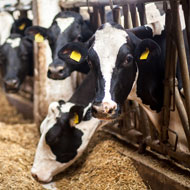Northern Ireland to consult on proposals to eradicate bovine TB

Mr Huey reports that the rates of bovine TB in Northern Ireland continue to rise.
A public consultation on proposals to eradicate Bovine TB (bTB) in Northern Ireland has been launched.
The consultation document comes in response to a report produced by the independent TB Strategic Partnership Group. Published in December 2016, the report made several recommendations including approaches to dealing with TB in wildlife and how to address bTB risk in the industry.
Chief veterinary officer for Northern Ireland, Robert Huey, said: “I am all too aware of the devastating impact of bovine TB right across the Northern Ireland agriculture industry. The rates of bovine TB continue to rise and latest figures show a herd incidence rate of 9.26 per cent.
“Given the significant rise in the incidence of bovine TB, the concern of the farming community and the pressure that rising bovine TB Programme costs has on our budget, the Department has decided that, in the broader public interest, we should move forward with a consultation on proposals responding to the recommendations made by TBSPG last December.”
The key proposals are:
• new management/partnership arrangements with a Northern Ireland Eradication Partnership Board, three sub-regional boards and ad hoc local disease teams;
• a number of enhancements and additions to the existing bovine TB Eradication Programme;
• a programme of badger removal and vaccination in targeted areas;
• greater emphasis and ownership by the farming industry on reducing risk through better herd health management;
• changes to the compensation system and the introduction of a payment for an annual herd test.
Mr Huey continued: “I would strongly encourage all those who are interested both inside and outside the farming community to read the proposals in full, as a package of measures which we believe can achieve bovine TB eradication, and respond as fully as possible to the consultation."
The consultation is now live and runs until 1 February 2018.



 The latest
The latest